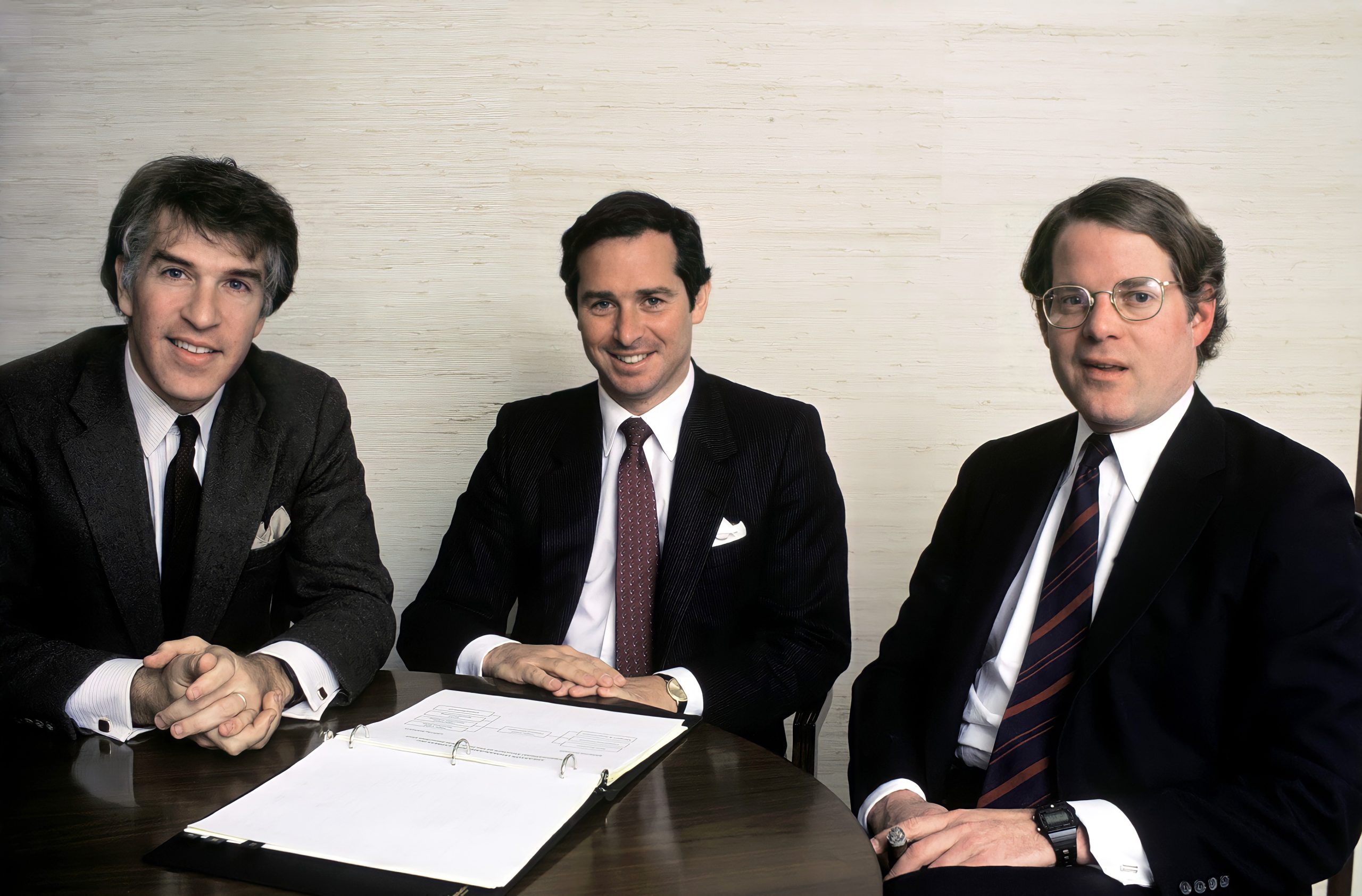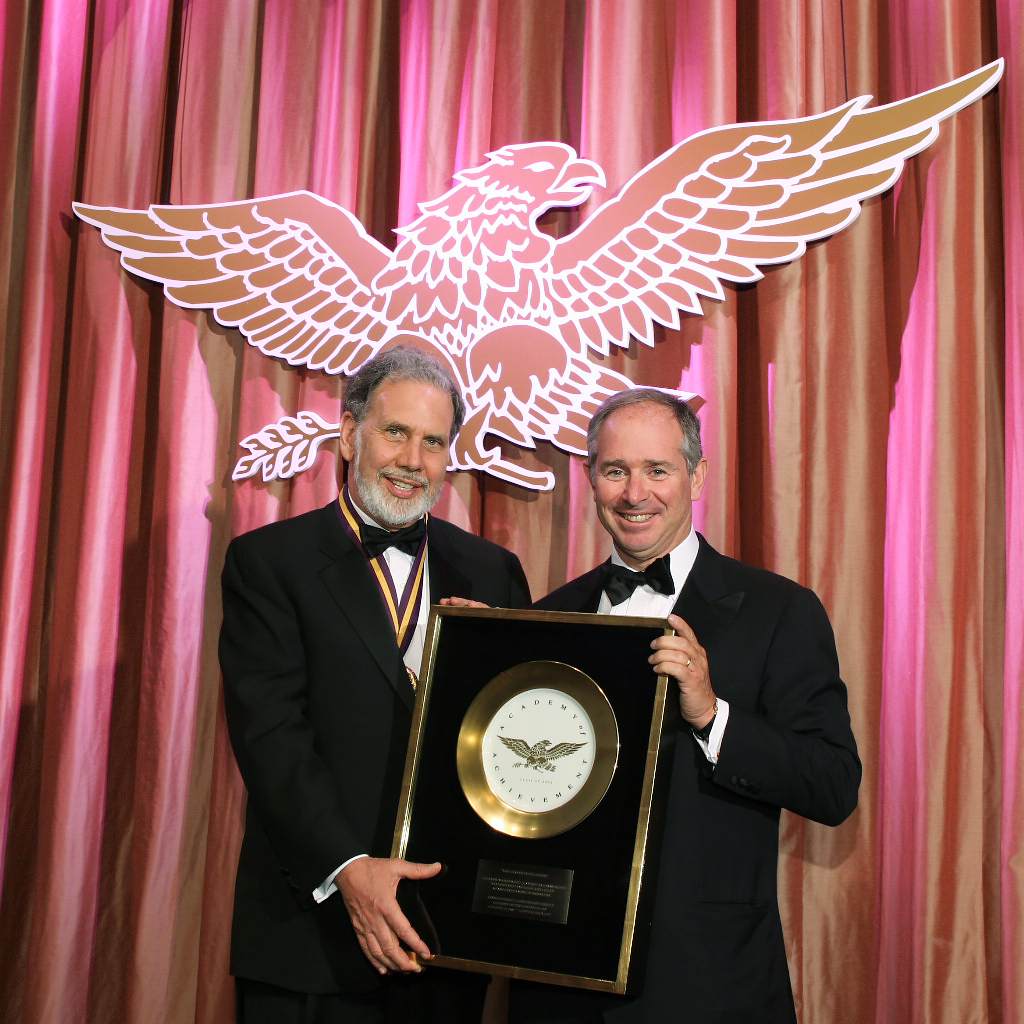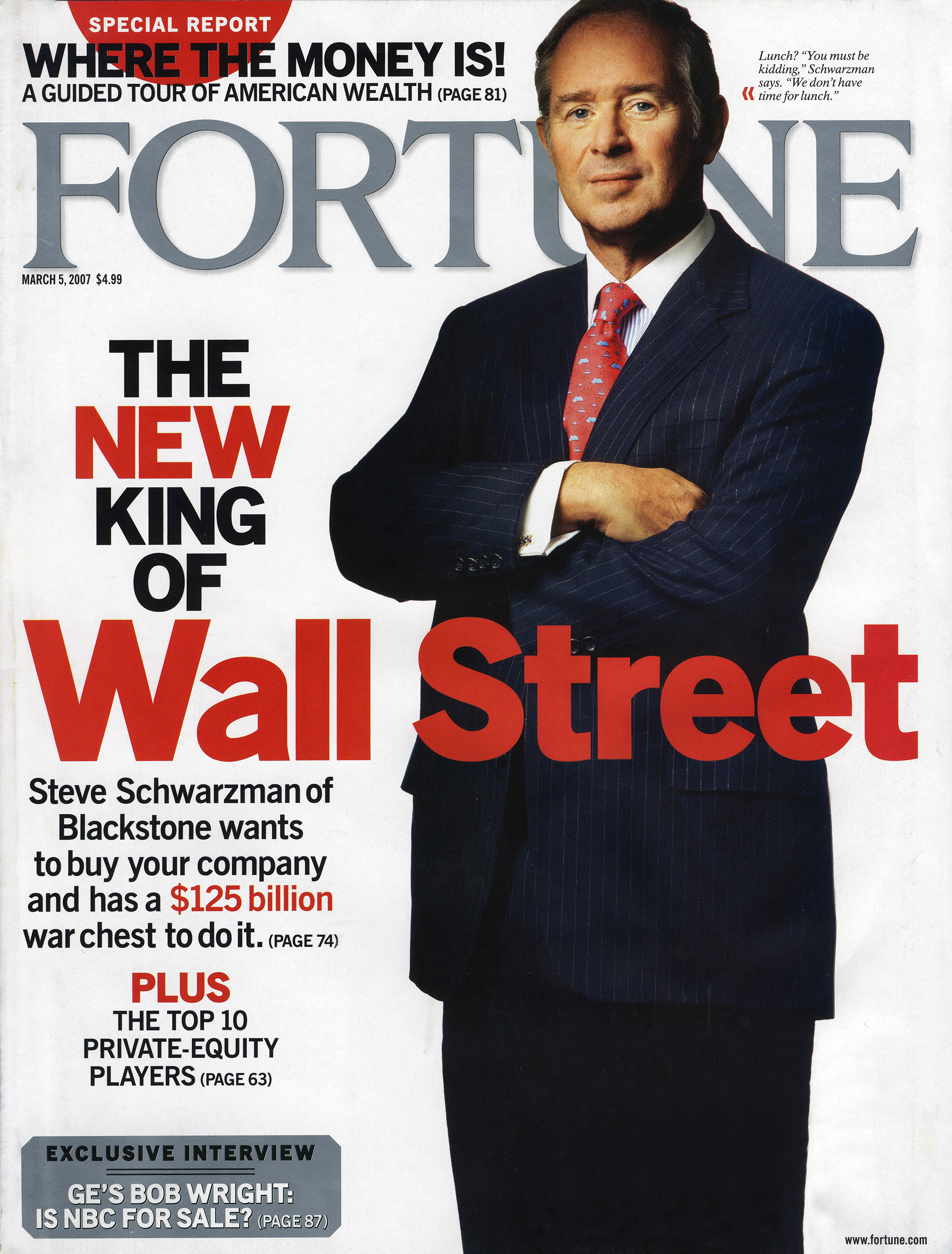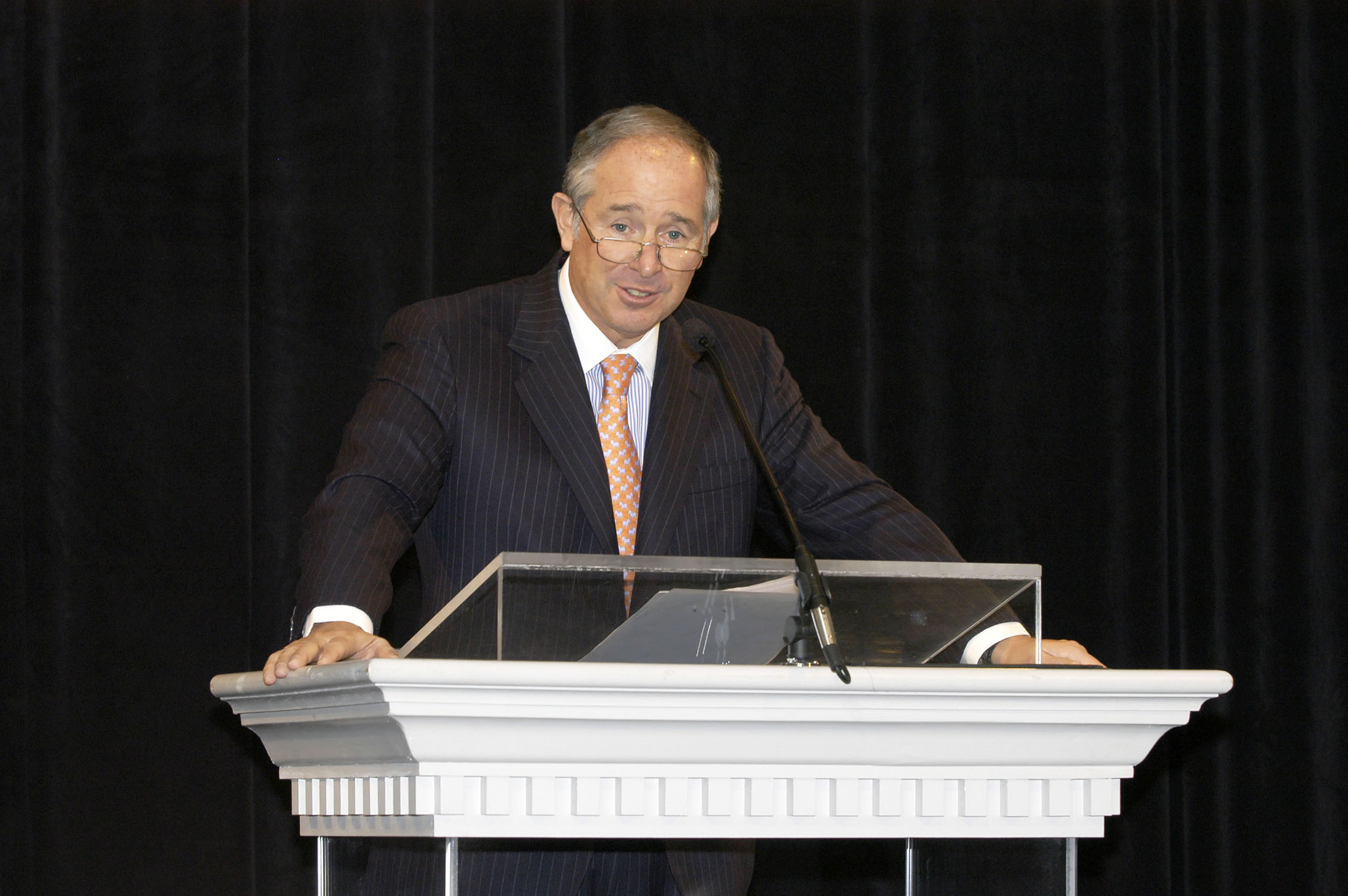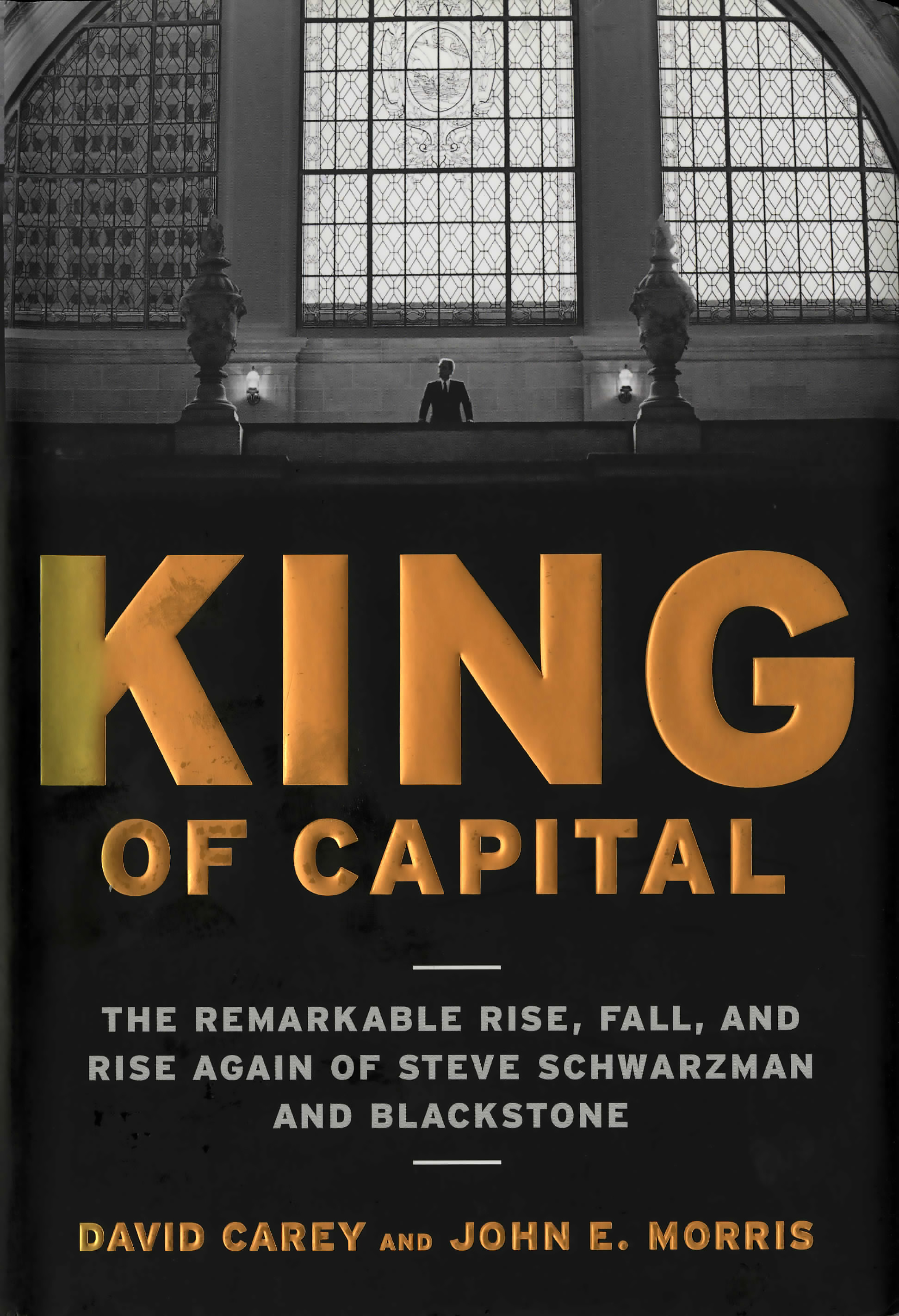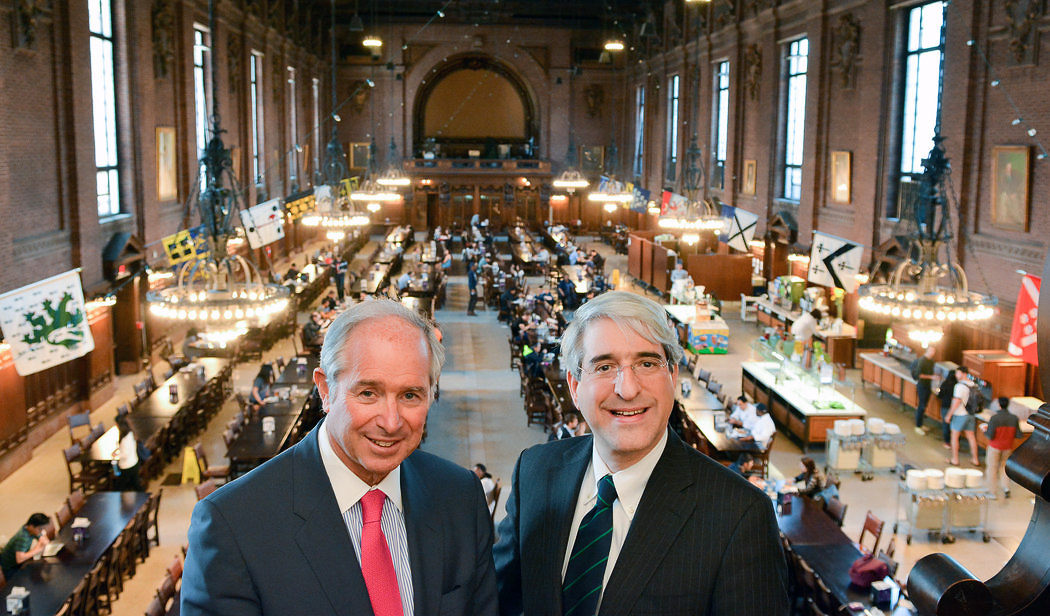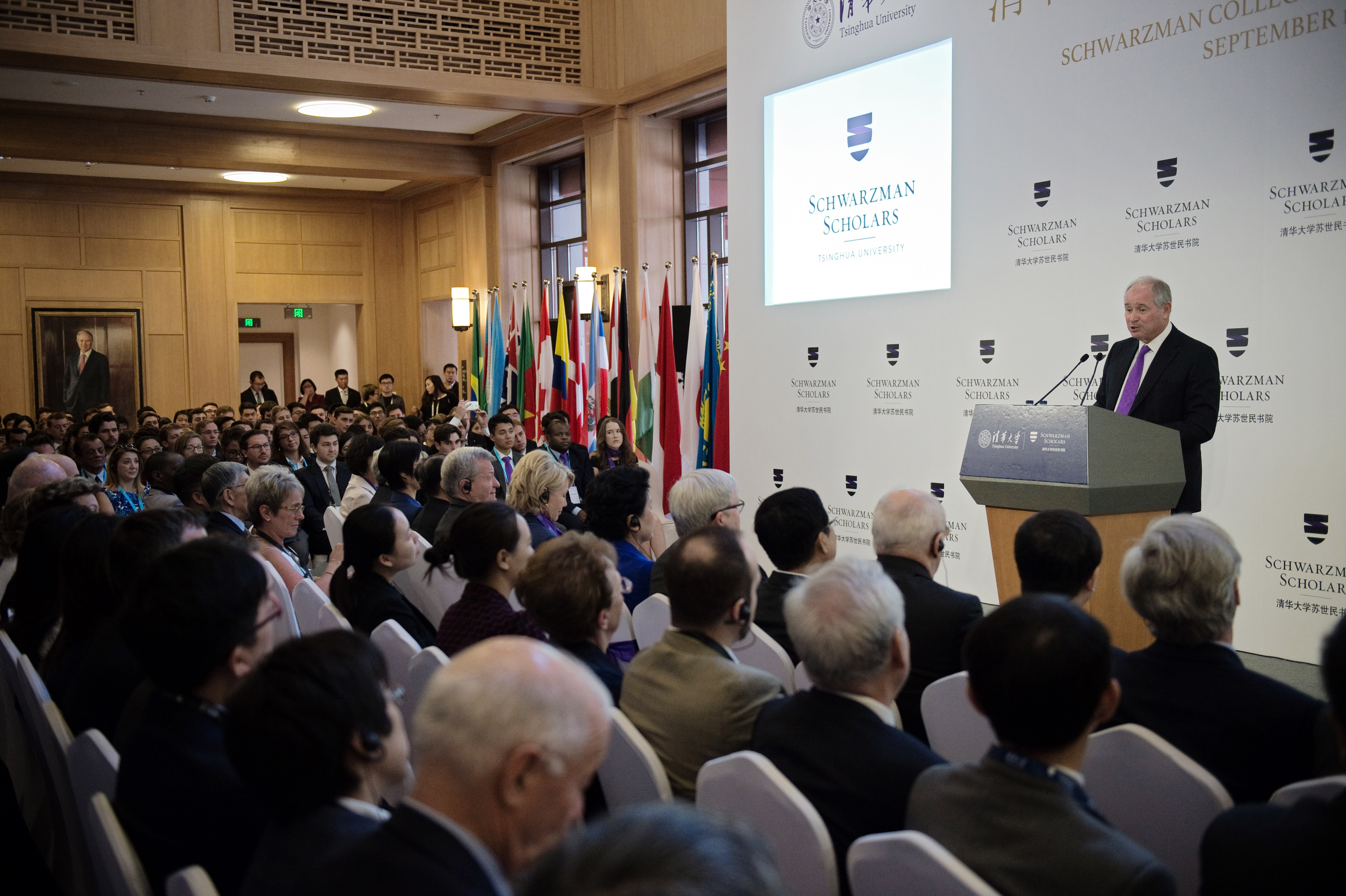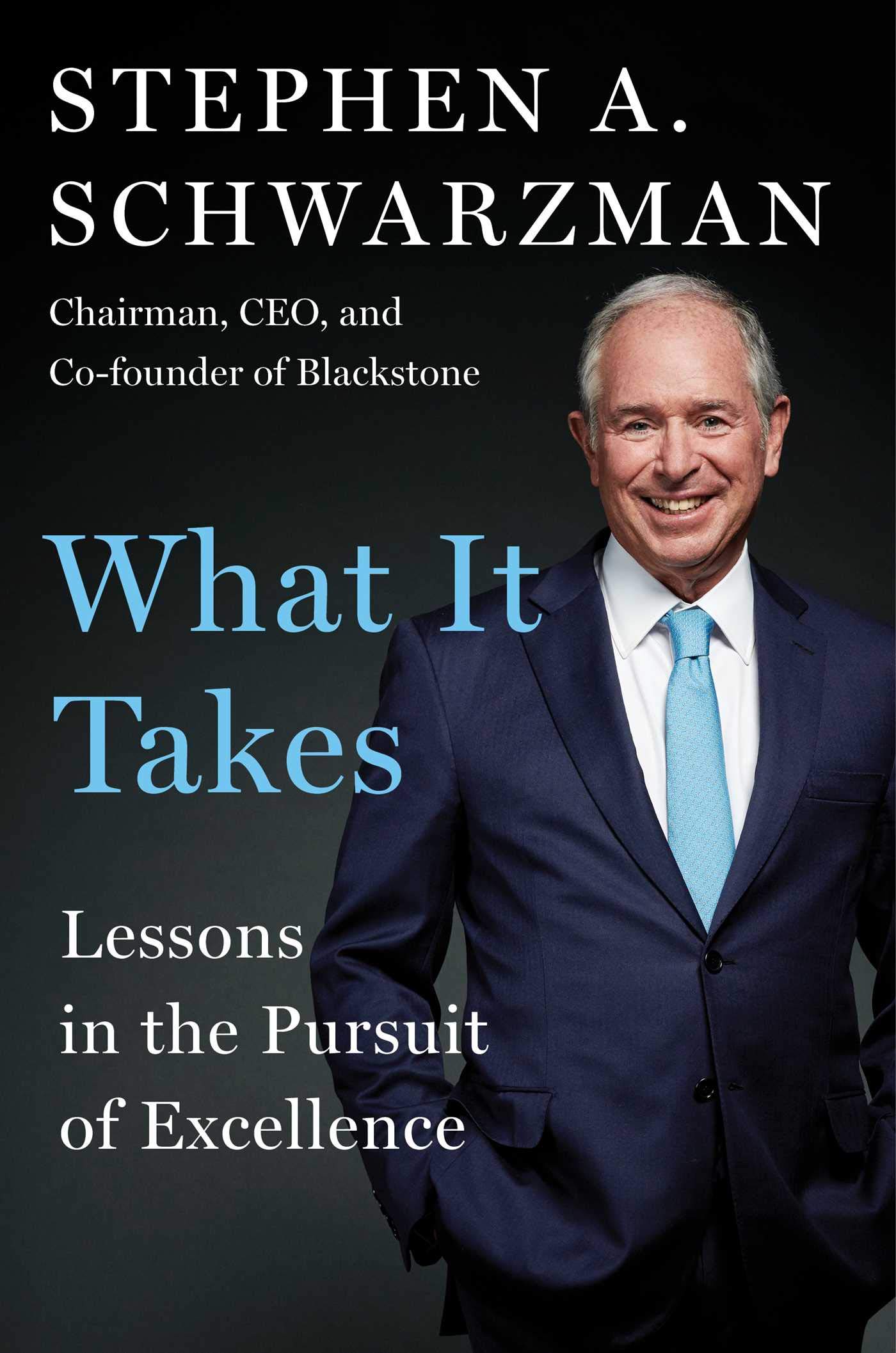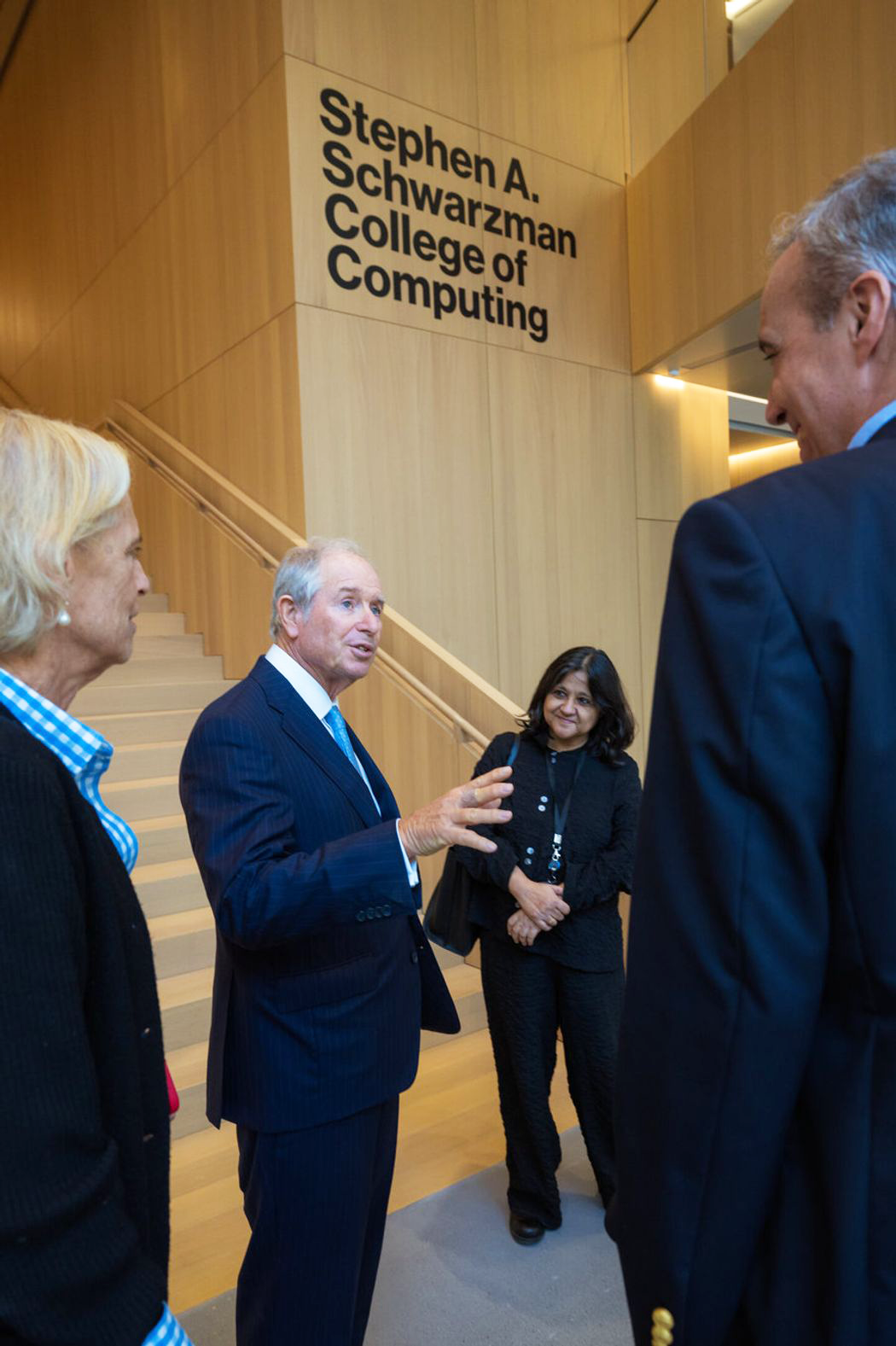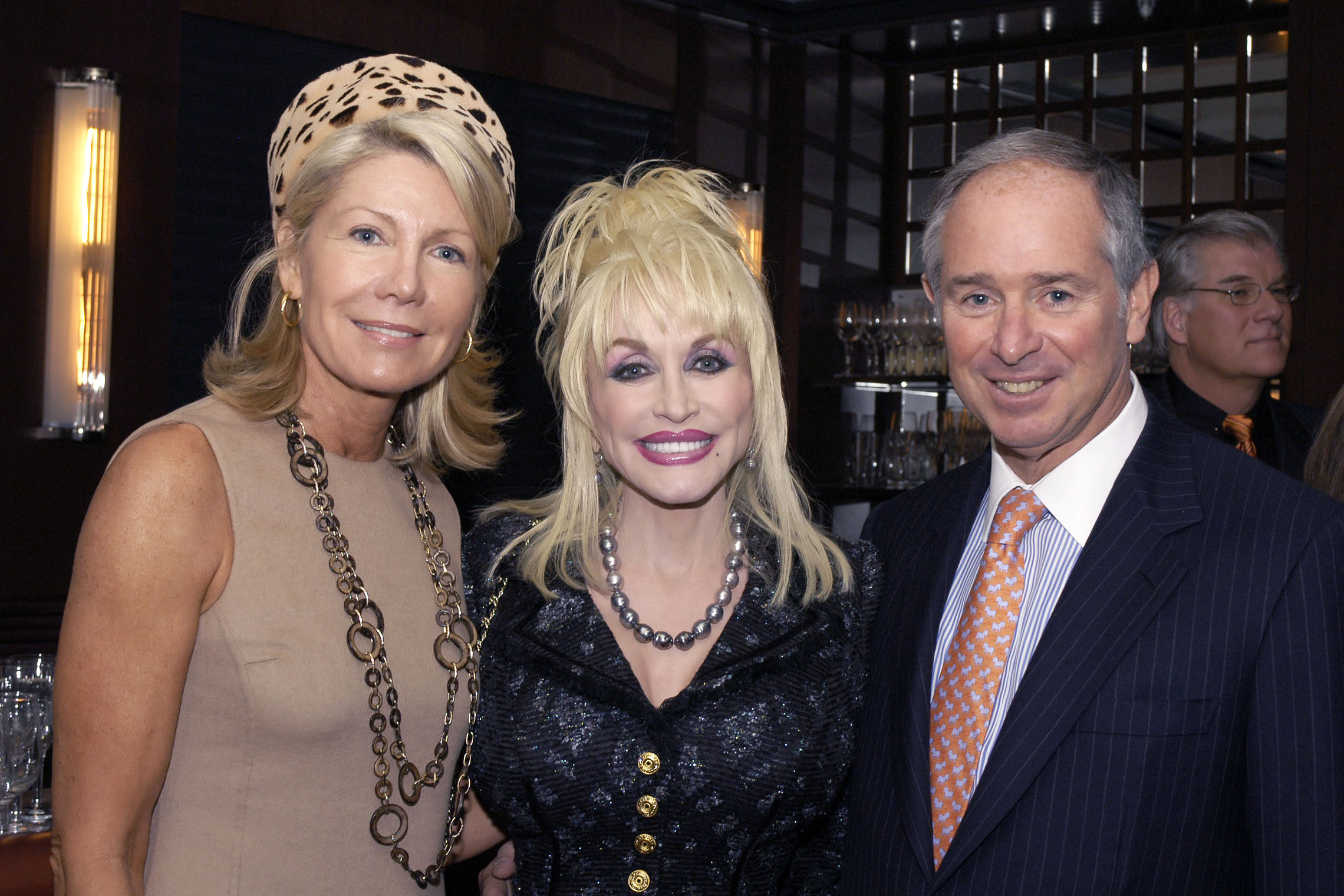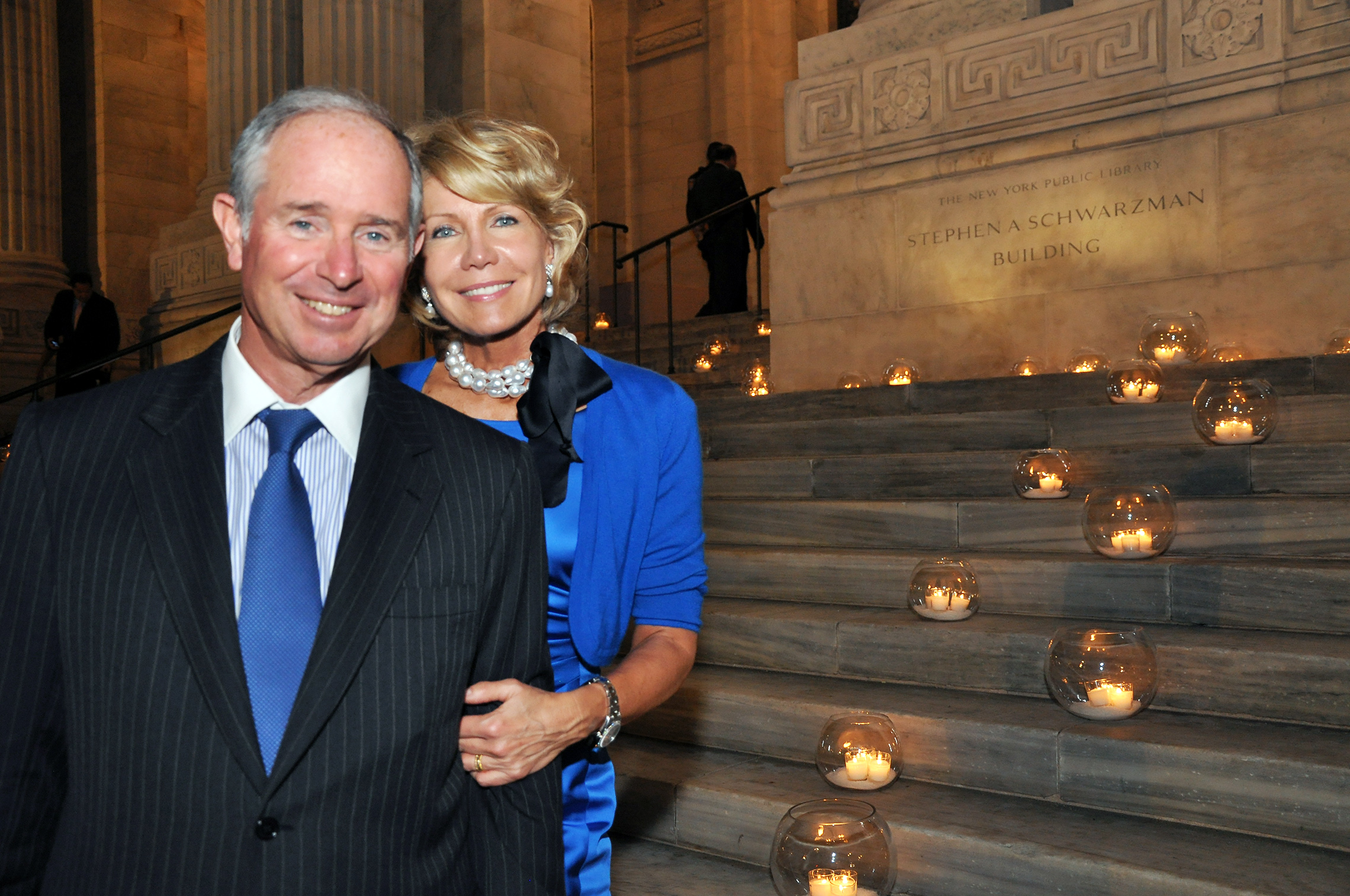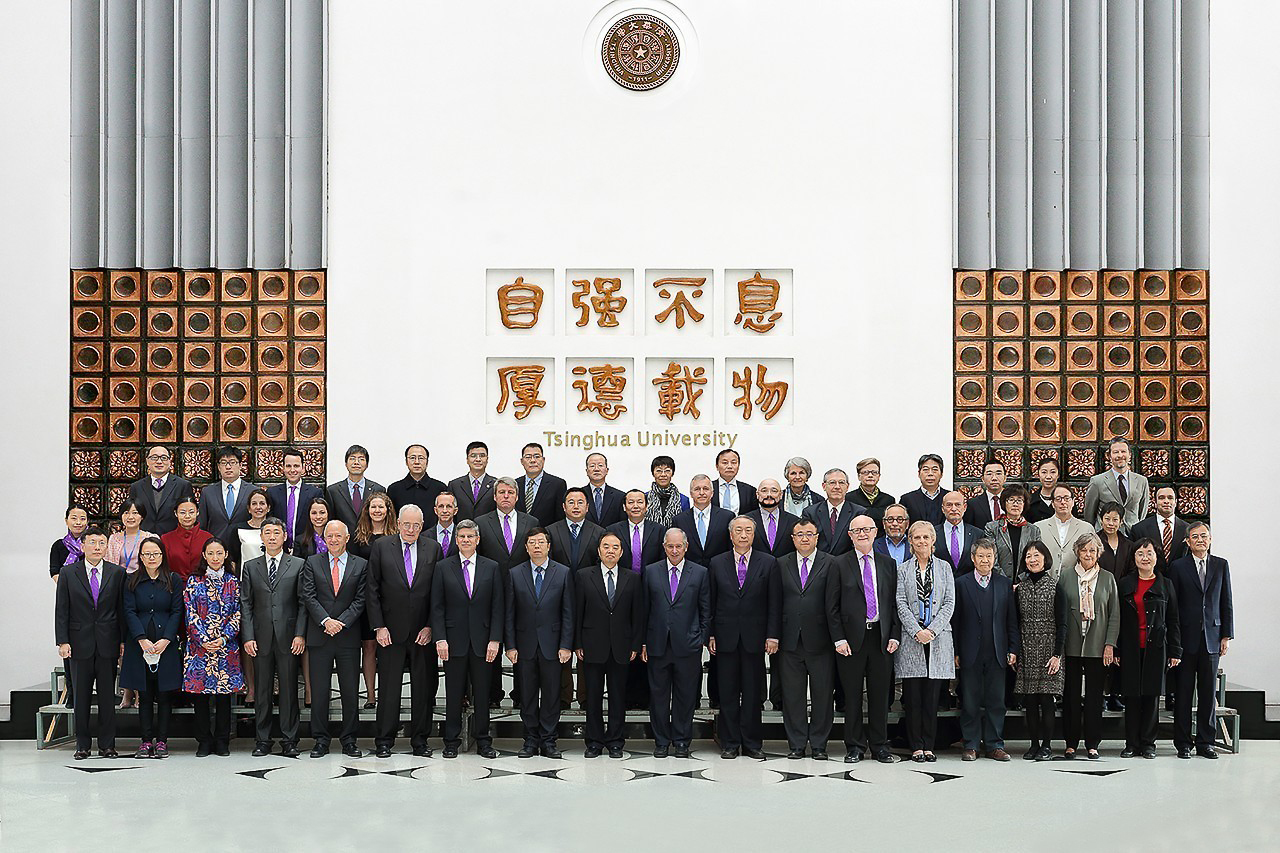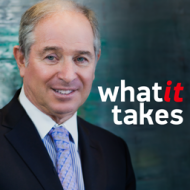Very few kids set their sights on being investment bankers when they grow up. So when you were about ten or twelve, what kind of kid were you, and what did you want to do?
Stephen Schwarzman: Wow. That’s a great question. At ten or twelve, all I wanted to do was basically win any sport I played in, and that’s what I liked to do then. Clearly, I evolved somewhat. I didn’t even know what investment banking was, at that age, let alone even in college.
As a ten- or twelve-year-old, did you think you might have a shot at a sports career? Were you good?
Stephen Schwarzman: I was pretty good for a kid. You’re never sure how big you’re going to grow and how strong you’re going to be, but at that age, I was big and strong and pretty well-coordinated, so that was what I enjoyed.
What about your family? Were there big expectations in any particular direction?
Stephen Schwarzman: I was the oldest child, and the expectation was to get everything right, and it was an interesting expectation because it wasn’t drummed into you. It was simply assumed. There wasn’t much reinforcement for doing things in a 100-percent manner, but you were just assumed to do it. That was the standard. No one discussed it; nobody bought into it. It was just part of what was expected.
Were both of your parents part of this climate of expectation?
Stephen Schwarzman: I think my mother was more the pusher, I guess. There’s a classic Jewish mother syndrome, and I certainly had, at a minimum, an acceptable level of pushing, which was, I think, culturally normal, at least where I came from. I think my dad wasn’t so much that way, but he’s a very, very smart fellow, smarter than I am, still. With that as a role model, it was somewhat hard to sort of out-think him because he’d usually have the right answer and still does catch little imperfections in logic. So that was what the family scenario was. It was very much from a place where — major metropolitan city, this happened to be Philadelphia, where it was, in the city — a place where people, typically, in the late ’50s, early ’60s, would move out and go to the suburbs. It was: could you blast your way out of the city and get to the suburbs? It has nothing to do with the child. That’s what the parents do, and my parents made that transition, which was a lucky thing for me.
Did your father’s work have anything to do with the financial world? Was there anything around that provided a model of that for you?
Stephen Schwarzman: Yes, it provided a unique model of something I did not want to do. He worked with his father in a retail business that sold curtains, linens, draperies, handkerchiefs. I started working there, in effect, at the age of five, which he did with his father, and I found it an absolutely horrible way to spend time. I didn’t like waiting on customers; I didn’t like folding merchandise. I didn’t like dusty basements where you had to mark merchandise, and I decided that whatever I did in life, that would not be part of it.
Did you ever tell him that?
Stephen Schwarzman: Of course.
Did he take it in good stride?
Stephen Schwarzman: He’s got a very amiable, wonderful disposition, and he heard that, and then I would end up back at the store the next year. So I think, during the time when I was a child, you more or less do what you’re told, subject to one or two years of revolution where I decided I had had it. But I don’t think that not going into that environment was heartbreaking for my dad. It was what he did.
Sometimes fathers want you to do anything but what they did, but it seems that he just had a sort of comfortable relationship with the issue.
Stephen Schwarzman: Yeah, absolutely. He worked with his dad, who was a very dominant personality, and my dad is not a dominant personality, so it would be out of character for him to be that way with me.
What did you see yourself doing back then? What did you think you were good at?
Stephen Schwarzman: I was good at a lot of athletic things. I was good at hitting a softball for long distance. I was good at running faster than anybody else I was with, and I loved the feeling of doing those things well.
There were always smarter kids in my class in high school. We had about 900 people in my class. And that’s a good-sized high school. The best I ever did was number 32, and that meant there were 31 people who were actually much smarter than I was. I was trying my maximum. I couldn’t do any better. And some people seemed to be pretty effortless who were better than me. I was good at leading people and mobilizing people, so I did that. I was president of my school and was a really good athlete. We were in a state championship team.
So I did the best I could with academics, but academics are interesting. Minds, as you learn when you are older, work differently. And the people who do really well in school are on a track that somebody designed for a definition of what’s good at school. Not everybody’s mind works like that. For me, it was always somewhat difficult. I always wished I was more capable in that area. I was good enough to get into good schools, but it was always like barely.
What do you think is different about the way your mind works?
Stephen Schwarzman: It’s more practical, creative. I guess you’d now call it more entrepreneurial.
How do you feed that creativity? Do you read a lot every day?
Stephen Schwarzman: I do. I read. I absorb news. I’m endlessly looking for inputs. I love meeting people for not too long because I can get what I need pretty quickly. So I’m constantly creating inputs for myself.
Do you have a good memory?
Stephen Schwarzman: Yeah, I never write anything down, and I could tell you conversations from ten or twenty years ago.
Now that’s a gift.
Stephen Schwarzman: I’m not sure it’s a gift. It’s what it is. Some people think it’s a little weird, but I can remember important things and who said what, what did they say, how did they say it.
Did you have a teacher or coaches who were an influence on you growing up?
Stephen Schwarzman: I had some amazing teachers and coaches. I had a history teacher in the eleventh grade in American history named Norman Schmitt who was wonderful. He just made American history burst forth, and I was entranced by it. I always liked to study and get good grades, but there were always kids smarter. I might be in the top — oh, I don’t know — six percent of my class, but that meant there were five percent that were smarter, and indeed they were.
I also had an amazing track coach, ironically named Jack Armstrong, very much like an all-American boy, and indeed, he was. When we ran competitively, we were second in the country in the AAU junior championships. His teams — as a testament to him, rather than any of the individuals like myself — when I graduated from high school, until that time, he had been 107 and 2 as a record in dual meets, which meant that he went through many different generations of kids, and the kids always mysteriously ended up being enormously capable, which was a testament to him. He would have all kinds of wonderful ways of motivating people. We used to train in the winter as well as the summer. We trained outdoors in the freezing cold, ran sprints and middle distances on frozen parking lots, which is a real challenge as the wind’s whipping and you’re wondering if your legs are going to go out from under you. No matter how miserable you felt, he would be there smiling, and as you rounded the location where he was, he’d say, “You’ve got to make some deposits on training day to make some withdrawals on meet day,” and he was very cheerful because, after a while, you were wondering why were you going through this level of agony.
So I realized what I was doing was making these horrible deposits of sort of bashing myself physically, so when it was time to actually compete, it was effortless. So I’ve learned many lessons from great inspirational people. But that seemed totally practical to me, unfortunately, and I hated every minute of it, but I liked the winning when we had meets. That was just an example.
But the camaraderie on the team was fantastic. I was the only Caucasian in most of the races that I was ever in because I ran sprints, so that made it sort of a whole cultural experience for me, which I really enjoyed.
I was also one of the student leader people. I was usually the president of my school — junior high school president, president of my high school. I was one of those — what do you call them? — student leader-type people.
Let’s talk a little about your experience at Yale University. How did you pick Yale?
Stephen Schwarzman: I went to Yale because when I was interviewing at schools, I saw a kid walking down a street — I can still see him right now — wearing sort of tan chinos, Bass Weejuns, which are a kind of shoe for us midlife-sters when we were young, and a blue long-sleeved shirt with a button-down collar and a corduroy sport coat, and I looked at that kid, and I said, “I want to be that kid.”
This role model is walking around the world somewhere and doesn’t know that he changed your life.
Stephen Schwarzman: Right. Who knows? So I went to Yale, and I had a real good experience there.
What did you study at Yale? What was your major?
Stephen Schwarzman: Remember, this was the 1960s, when everything was touchy-feely. I was in an interdisciplinary major — which was a new thing then — which was psychology, sociology, anthropology, and biology, which is really sort of the study of the human being. Why do they think what they think? Why do they act the way they act? You studied from all four of those disciplines.
So at some point did your father start whispering in your ear, “What are you going to do with your life?”
Stephen Schwarzman: When all fathers do. That’s a normal thing. I’m now a father, and I have a child that’s a junior in college, and I know better than to whisper because when you’re whispering, they’re truly not listening. You have to let them do their own thing.
So how did you transition from these interdisciplinary studies to getting involved in the business world?
I remember interviewing with a company. It’s fun for me to remember some of these things. It was a company called Pan American Airlines, which, at that point, was the dominant international carrier, subsequently bankrupt, and it was started by Yale graduate Juan Trippe. So they interviewed at school, and I went to interview with them, and I sat down, and there was a very establishment-looking fellow, and he said, “Well, why do you want to work at Pan American?” And I said, “Well, I’ve sort of got an idea.” I said, “The Vietnam War looks like it’s coming to a close, and there’s probably a lot of surplus airplanes around, and why don’t you just buy up a lot of those airplanes and go into the cargo business?” And the guy looked at me like I was completely deranged, which may have been true, and he said, “It’s not your job to think about things like that.”
What a response!
I listened to that, and I said, “I don’t know anything about business, but I think this company is going to do very badly if that’s the response of their representative to what I thought was a pretty clever idea.” There were companies started around that time, apparently, to do that, like Flying Tiger and other types of things.
It’s not a ridiculous suggestion.
Stephen Schwarzman: Given the Pan Am name, which was the best-branded name in the airline business. I was 21. What did I know? I thought that was a good thing, but it didn’t sell, and I didn’t go to Pan Am. I had no job when I graduated, and it’s a wonderful story of how I ended up where I went to.
I was working at a reunion because I didn’t have much money, and I also had no plans, and I was a senior. I don’t know why I did this, but there was a family at these reunions. This was the 15th reunion, so that meant that the people were 37 years old. There was a family having a picnic in the quadrangle, and I thought they looked really romantic and like a nice family. And I went out and, for no reason — because I didn’t even have any money, really — I bought a Babar the Elephant book, which is a book that my parents used to read to me. I just went over, and I gave the book to this kid. The father looked up and said, “What are you doing?” I said, “I don’t know what I’m doing, but I used to read this as a kid. You look like you have two wonderful children.” And the fellow was a gentleman named Bill Donaldson, and Bill started a firm that was very small then, called Donaldson, Lufkin & Jenrette.
I didn’t do anything directly with him at that point, but he had a friend that was sitting with him named Larry Noble, and Larry worked at the admissions office, and Larry sort of befriended me. And you know, as I was looking for a job, he would introduce me to people in New York. At that point, this was a very formal world of finance, and I had had no economics courses. In fact, I didn’t even own a suit. So I bought my first suit, and Larry would send me on interviews. I met the number-two person at one of the New York banks. I had only been in a bank to make a deposit in a passbook, and here I was meeting the number-two person at some giant money center bank. I could remember being almost completely overwhelmed that I went to this man’s office, and he offered me lunch, and it was right in the next room. The idea that, one, you could sort of offer somebody lunch in an office building, and second, that he would do that with me, was pretty overwhelming. The offices were so big, I thought I was on one of those walking belts at an airport, going the wrong way — I could never get to his office, it was so far. But he offered me a job. He’s a very nice man, and he offered me a job and recommended I not take it. And I said, “Why is that?” He said, “I think that you’re too smart and too quick for my type of organization. What you should do is go to an organization that’s very small, comprised of very bright people doing anything.” He said, “It doesn’t matter what they do. It just matters that it’s small and the people are very smart.” He said, “Otherwise, you’re going to be unhappy.”
Wonderful advice.
Stephen Schwarzman: I went back to this fellow, Larry Noble, and said that was the advice. He said, “Oh, you should go see Bill Donaldson. He has a small investment banking firm.” I went down to see him, and the appointment — he was late, he was doing something else — and I was sitting in the lobby, and at that point, they had nothing but young guys working there and beautiful girls, and I was watching all this, taking it in, and looking at this skyline out of a new building, 140 Broadway, in 1969. Then I went to see Bill for my interview, and he said, “Why do you want to work here?” And I said, “Frankly, I don’t even know what you do here, but I know that everybody I’ve seen is very excited about it, and with all these bright guys and pretty women, whatever they’re doing, I want to do it.” And he gave me a big smile.
The right answer.
Stephen Schwarzman: He said, “That’s a good reason,” and offered me a job. I was there for six months, and then I went into the Army Reserves and then back to Harvard Business School.
By this point, it sounds like you were set on a career. Was the decision to go to Harvard Business School a decision for banking, particularly?
Stephen Schwarzman: Well, I learned an interesting thing. People have observed that you only learn truly by failing, and I was, I thought, a complete failure at this job. I had no economics. I had no ability to read a financial statement. I had never had accounting. They gave me an office and a secretary and some annual reports and assignments. I didn’t even know how to approach it. I’m pretty good on my feet. I’m pretty decent at bobbing and weaving, but there’s only so long you can bob and weave when you don’t have a good base. So it became clear to me, without anybody advising me, that leaving myself in an environment where I was intellectually unprepared was a danger not only to me but to everybody that I had anything to do with. So I went to business school, really, just to deal with this complete lack of preparation that I had. I really didn’t like the kind of research-oriented business that DLJ was doing. I found I wasn’t particularly good at that either, instinctively, so I interviewed at a variety of businesses out of business school, investment banks and advertising businesses and I think a consulting business.
I’m almost reluctant to tell you some of these stories on tape. I remember going to an advertising firm. They offered me a job, and the compensation was $10,000. So I looked at the fellow who offered me the job, who thought it was a wonderful thing, and I started laughing, and he looked at me and he said, “Too high or too low?” And I said, “The fact that you wouldn’t know is the problem.” The starting salaries at that point in the investment banking business were $17,000; he was at $10,000. Now you know, when you’re off by that percentage, that’s pretty bad. And the fact that he was so unaware of what sort of was being paid competitively, I said, “Well, this is an industry where you can’t make a lot of money if they don’t really know even where they are.” I interviewed at the different investment banking firms and in the corporate finance business, which I sort of thought felt like the right thing. It felt like the right thing because you were helping people. In other words, executives would tell you their problems, and you would come up with a solution. You were both on the same team, and they were helping, you were helping. That seemed like something that wasn’t too complex. You didn’t have to be over-burdened with intellect. We’re not talking about brain surgery here. This is finance — add, subtract, multiply, and divide. It wasn’t until decades later that calculus really came into finance on the trading side. So it seemed a comfortable fit.
Was it the relationships part of the business that attracted you?
Stephen Schwarzman: When I was at Yale, I figured out what I wanted to do, but I didn’t know it existed. I figured that I wanted to be a telephone switchboard — and we don’t have telephone switchboards, just about, anymore — but I wanted to have coming in enormous amounts of data, I wanted it to go into a central processor, and I wanted some kind of output. But I really wanted the volumes of input, and I didn’t know where in the world I could find a job like that. I didn’t know it was investment banking. I didn’t have any real understanding of investment banking, so I just started looking around, and I guessed Pan Am wasn’t it, and advertising wasn’t it. Consulting was okay, but nobody really listened to you. I mean they do, but usually you’re hired for political purposes as often as real purposes — you know, have one executive’s view be the controlling one, or to convince a board to do something that maybe they don’t want to do. But I was very lucky. As soon as I sort of found this corporate finance field, I said, “That’s it.”
You recognized it?
Stephen Schwarzman: I recognized that that was the model that I already had in my head. That was a fun model because you keep getting all this stimuli — and always changing — and then you need to do something with it. And then you actually make something happen, not just talk about it.
You became the managing director of Lehman Brothers at age 31. You must have been pretty good at it. What do you think was propelling you forward?
Stephen Schwarzman: I think investment banking is pretty easy. The reason why I was probably pretty good at it is that it’s very easy to get the sort of fundamental base for it. After that, it’s anticipating what’s going to happen, figuring out new things, new relationships, solving problems that people haven’t focused on in the right way. I don’t know if that describes it. Here’s just one thing I can remember, just sort of at random, which I was proud of at the time. It seemed pretty simple to me.
There was one of these development institutions like the World Bank — it had a different name — and they had a variety of bonds outstanding, and each of those bonds had what’s called covenants, which are really restrictions in them. The bank wanted to do something but wasn’t able to because some of these issues forbid them, and they still wanted to do something, but they couldn’t get those bonds in. They couldn’t call them. They were stuck with it. It was an important initiative, and everybody was real concerned. They didn’t know what to do. So nobody could solve the problem, and I was one of the people working on this, and I remember going home at night, and I often think of things when I’m sleeping. I don’t sleep real deep REM stuff, and I woke up, and I said, “You know what? What’s the problem here? The problem is that these bondholders want to be protected for something. And what’s the worst that can happen to them? The worst that can happen is if you did the bad thing and it didn’t work out, they’d lose their money, right?” So I said, “Why don’t we just take a bunch of money” — because banks always have money — “and just dedicate that money behind those bonds and go ahead and do whatever we want to do. Because the worst that can happen is that they lose their money, and if we assure them that they could never lose their money, then they don’t have to worry. And if they don’t have to worry, they have no cause for damages against the institution for going ahead and doing something.” So I came in with some elaborate sort of proposal to do that for large amounts of money — at that point, large amounts were hundreds of millions; now it would be tens of billions — and everybody just sort of sat there and went, “Geez, no one’s ever done this.” And I said, “Well, so what? Aren’t we addressing the problem?”
They all said, “Yeah, but it’s not legal.” I said, “Forget the legal part for the moment. It’s not technically legal, but if we went to all the bondholders and asked them for a vote and said there’s no conceivable way you can lose money because the money to pay off the bonds and their interest is already dedicated, and we got a pretty high percentage of the vote,” I said, “that seems to me like a risk you can take because you’re doing nothing unethical. You’re protecting the bondholders better than they are today, okay? Today, they just have to rely on the general credit of the institution, and we’re making it even better. We’re putting a few hundred million dollars’ worth of cash behind to guarantee the payment. I said, “Who could be unhappy?” So they did that.
You didn’t get the Pan Am response. At the end, they bought in.
Stephen Schwarzman: Right. They bought in because they had a problem, and they wanted that problem solved.
I’ve always found, in investment banking, that there’s real logic to everything, and I don’t understand why somebody else didn’t come up with that. They probably would have, at some point, but you know, I’ve always found — and I really didn’t specialize in doing financings like that. I really did merger things with most of my career, and that’s just another derivation of solving problems. In the merger business, there’s also the ability to sort of go out on a limb and sort of invent things, sort of creatively imagine “What would this company buy?” before they might even think about it. And then sort of go to them and convince them, and then convince the other side to do something, or negotiation, which is — you know, a lot of people don’t like really being in zero-sum games, and you try and make a zero-sum game not a zero-sum game. But you know, that’s your first level of solving of problems. But at the end of the day, if money’s being paid, usually it’s out of somebody’s pocket into somebody else’s pocket. So that is a zero-sum game, at the end of the day, and usually that generates huge amounts of conflict and tension. A lot of people don’t like being in situations like that. And for whatever the series of reasons, that didn’t bother me. I don’t always enjoy it, but it didn’t bother me.
It would be normal for the other person to get angry if you were demanding a lot of money or something. That would be a normal response. If I were on the other side, it would just be the opposite. I found that I was pretty well adapted for this stuff, in large part because finance has much to do with understanding what’s on the other person’s mind. And if you can understand what’s on their mind, in effect, that’s the problem to solve. There’s a zone of fairness where you can solve that for that person, and at the same time not disadvantage the other person you’re representing. So that was probably what made me pretty good. You don’t even have to meet with the other people to know what’s on their mind because you say, “Well if I were them, what would I want?”
It’s a kind of empathy.
Stephen Schwarzman: Whatever.
The decisive moment in your career was probably when you left Lehman Brothers to found The Blackstone Group. Was that a difficult decision to make? There was a lot at stake.
Stephen Schwarzman: Yes and no. I didn’t view it as particularly bold. One has to understand context, I think, on this.
In 1984, Lehman Brothers, where I had worked for my career, had been sold to American Express. I actually was the person handling that transaction. I was 36 years old, or 35; I forget which. I had a non-competition agreement, and as part of my wanting to do that deal, I wanted to leave for a variety of reasons. I didn’t like what ethically had happened with the firm. I didn’t want to be with the people — not all the people, but the leadership people — so I worked out a situation where I joined the former chairman of the firm at Lehman, who had been pushed out, which necessitated the need for the sale. He and I had always worked very closely together. So all we were trying to do by forming Blackstone was sort of re-forming our own working relationship. We didn’t view it — and on this, I’m sure I was sort of colossally naïve — as that big a step. I knew we had always been successful doing almost everything together, commercially, and I didn’t understand why we wouldn’t be. The fact that we had no phone, no office, no company, that small little companies like this were not successful in investment banking; in fact, they didn’t exist at all. There was only one of them that existed, which was a small firm founded by a fellow named Jim Wolfensohn. Jim’s currently the head of the World Bank, but even Jim had never done any large mergers until that time. We just assumed that we would be accepted as the sort of equivalent of a Salomon Brothers or a Lehman Brothers or a Goldman Sachs or Morgan Stanley, and I guess that’s the height of ridiculous hubris. Because we were too silly to understand that people might be worried about that, we went ahead, and it worked out.
It sure did! It worked out pretty well.
Stephen Schwarzman: Pretty well. I must say, for those who haven’t had the experience of doing startup businesses — at least in the mid-’80s, it wasn’t quite as amusing as apparently it is in 1998 or ’97, on the Internet, where there’s tons of money available now. That was not the case then.
In New York, which may be atypical in the United States, people are only happy if someone they know well is failing, particularly when you’re more vulnerable in a smaller setting like we were at Blackstone. I know there were many former colleagues, who were staying at big firms, who were looking at what we were doing, and some were hoping that we’d make it. But, you know, we were somewhat of a threat if we could make it just in a small organization and end up making a good deal more financially than the people who stayed at the large one. That was, in effect, a threat to a system. We were not aware of this, of course.
All we were trying to do was pay the rent. We had more modest expectations at the beginning. But we took a number of large leaps at the firm, and part of that is — you asked a question earlier: “What makes someone successful?” And I think that another answer is sort of feeling what’s going on around you, seeing what’s going on around you and taking a big step to take advantage of that. One of those steps, for us, is the second year we were formed, we decided to go forward with a plan we had when we started, to go into the leveraged buyout business, and neither my partner nor I had ever done a leveraged buyout, which one might think would be a liability when raising money.
There’s a certain pattern of this in your life.
Stephen Schwarzman: My partner is a very experienced, capable fellow, previously Secretary of Commerce and Chairman of Lehman Brothers. He wanted us to raise $50 million to do our fund and start doing smaller deals, learn, and then raise something larger. I had been over visiting one of the large firms, and I looked at their balance sheet — it actually was a company called First Boston — and at that point in history, they had a billion dollars of equity. I said, “You know what? I think it would be fun to have a billion dollars of equity without all the people.” And I said, “I think we could do that.”
I went back and met with my partner, and I said, “We’re going to raise a billion dollars.” And at that time, there were only two other organizations on the planet that had a billion dollars, and he said, “How can we do that? We don’t have any experience.” And I said, “I know we can.” I said, “The time is right.” We’re in the ’80s — it’s sort of 1986. There’s enormous momentum. Leveraged buyouts are becoming very popular. They’re going on the covers of magazines, on the front pages of newspapers. There aren’t enough vehicles to take advantage of this. We’re well-known people. And he said, quite intelligently, “That’s a long way from a billion dollars.” And I said, “I just know we can do this; and, in fact, if we tell people that we want a billion dollars, then if they were going to just give us $10 million for a small thing, they’ll give us $50 million, okay, because we’ll have scaled-up expectations.” And he said, “You know, I’m going to be a good partner, but I think we’re biting off more than we can chew,” and he was probably right. We ended up raising $850 million, going through enormous amounts of difficulty. We subsequently raised another $100 million from one of those investors. So we got to 960, actually, at the end, and it launched the firm in a scale where we always did very big things because that’s what I wanted to do. It’s also what my partner wanted to do. He just didn’t know that that was achievable. And you know, none of us knew, but he was a good enough partner and a smart enough man to also back my vision of what I thought was achievable.
Now that’s just an instinct, and one has those types of instincts in my type of business. I don’t know how one describes how you would know that that could happen, but it’s from reading the newspaper, seeing what’s going on, feeling what people are talking about, and just knowing that ought to be possible.
Can you recognize that in a young person who’s interested in becoming part of this world?
Stephen Schwarzman: Oh, sure. Sure. There are certain ways that people think, patterns of thought. In our firm, we’ve gone into a lot of new businesses, and we’re subsequently quite big. We’re one of the biggest investors in what are now called alternative assets — which is leveraged buyouts, real estate, hedge funds, mezzanine debt — in the world, and every time we have one of these new perceptions that there’s a really interesting thing to be done, you just do it. It’s sort of like a basketball player who only shoots when they get a real good sense that they’re in the zone, okay? It’s not like a player who keeps forcing because they’re throwing them the ball, that they’ve got to put it up, they have a cold hand, and they’re throwing up bricks, and they have to keep doing it. This is a game that you play only when you have a really strong feeling. It’s like fishing in a pond that’s been deeply stocked with giant trout. Now, you know that that pond is stocked, but other people don’t necessarily agree with you, and there is a certainty that comes when you just know that things are lining up. You don’t have to be very smart about this, either. We went into the real estate business in 1991. I’d never bought any real estate. I didn’t even understand it. I always felt uncomfortable with real estate because buildings don’t move and neighborhoods change. So, can’t you make a bad decision? Companies can at least change their products. Buildings don’t move. There they are.
We were in the recession, and real estate was collapsing. Everybody wanted to sell real estate, and somebody brought us a deal which had a 15-percent yield on it. It was a bunch of apartment buildings and ironically — Little Rock, Arkansas — bankruptcy of a savings-and-loan. I don’t know if it was the same one that was involved with, you know, the more popular things of the time. And we could borrow money off of that 15-percent yield and earn about 23-24 percent, at the bottom of a recession, with apartments that were close to new. And I said, “Well, what can go wrong here? The economy can’t go any worse than it is now. If the economy gets stronger, then rents will go up. It’s hard to borrow money now…” (at that time). And even with the difficulty of borrowing money, we were earning 24 percent on our equity. So I figured when times got better, money would be more available, interest rates would be down further — you could borrow more on the property — and so there was no downside, there was only upside. The present moment we were doing it was really already excellent. So why not just buy as much real estate as you could possibly find? And there was a whole country of real estate to be found at that time. Now to me, this doesn’t go into the blinding insight mode. Anybody, when told those same facts, I would assume, would act rationally and would be buying real estate. In point of fact, the problem was, everybody who would normally be buying real estate had already lost a fortune and was in no position because most of them were either bankrupt or undergoing enormous difficulties with their existing properties. They couldn’t go ahead, and if they went to a bank to borrow money, they were creating bankruptcies for the same banks, so the banks didn’t want to talk to them. And we were sort of there alone with two or three other groups of people who had never been in real estate and saw the same things.
As of today, how many companies does Blackstone own?
Stephen Schwarzman: Well, I’m not sure. It depends on how you define those. We usually have, in our private equity area, like 80 to 120 of them. It depends what we’re selling and how rapidly we’re selling and how rapidly we’re buying. We own hundreds of billions of dollars of real estate. And then we have other companies we have minority interests in and are tactical opportunities — business — and also, in our credit business. So, you know, I’ve never totaled that up. I should. Because that way I could have a snappy answer.
You work on such a big scale. What does it feel like to deal with such bigness?
Stephen Schwarzman: I don’t think about it as big because we operate with small groups of people around the firm, and we have verticals that specialize in doing things, whether it’s owning companies or owning real estate or one business that does sort of both.
We have all kinds of activities. And the way I look at them and the way I look at ourselves is that we’re just a small partnership. And every meeting you go to, you basically have a relatively reasonable number of people there that you can talk to. If you could talk to everybody, then there’s a sense of intimacy. And what we do is we use our screens around the world, our video screens, to invite the people in those locations into that intimate conversation.
So I don’t accept the concept of bigness. I don’t like the concept of bigness. I like intimacy, and I think everybody at the firm should feel that way. So we run it in a way where people know other people, and where it’s personal and it touches you. The idea of being part of a big thing, where “big” typically means impersonal, that’s a bad outcome.
Was there one deal you can think of that you’re particularly proud that you put together?
Stephen Schwarzman: We’ve done so much stuff…
When you’re beginning to do something like that, do you have a timeline? Or is it just all in your head? “I’m going to do this and then I’m going to do that.”
Stephen Schwarzman: We have teams. So I’m not some lone ranger doing deals here with people picking up pieces. It doesn’t work like that. There was one that’s particularly funny because I actually didn’t want to do it, and it turned out to be enormously successful.
There’s a little amusement venue in London that was called the London Dungeon. People take their kids there. It’s by the Tower of London, and you go under sort of an overpass. They sort of built caves, and Middle Ages guys in armor come out with hatchets and almost hit you in the head.
One of my partners — in this case, Joe Baratta — wanted to buy this little company. It only cost $80 million. Now for regular people, $80 million is a lot of dollars. But in our world, $80 million is very, very small for an acquisition. And you couldn’t make the London Dungeon bigger. It occupied all the space it could.
And so I said, “Joe, why would we ever do this? I mean this is ridiculous. We’re going to own the London Dungeon?” And he said, “But the manager is so terrific that he’s going to find other things to do. This guy is marvelous.” I tried to make it go away, but Joe kept coming back. So at the end, I said to myself, “Well, okay, it’s $80 million. Maybe we’re overpaying, maybe we’re not. The worst that’s going to happen is that the Dungeon’s going to stay full, and whatever cash flow we make from the Dungeon will continue. And if it doesn’t work, we can sell the Dungeon to somebody else.” So I said, “Okay, go ahead.”
By the time Joe and the manager of that business bought things — they bought Legoland, which was making no money and now it makes a fortune; they bought Gardaland, which is the largest amusement park in Italy; Madame Tussauds. It was endless. We ended up as the second biggest theme park company in the world. And it didn’t have anything to do with me. It had to do with one of our gifted people, Joe Baratta, who believed in somebody — and I just got beaten down enough, I did it.
Is the magic there that you get good people and you believe in them?
Stephen Schwarzman: Yeah. And you don’t always believe in everybody just for the heck of it. They have to prove it. But Joe is an interesting guy, and he totally believed in the manager. I met him and he was really good. So sometimes you just do things.
So today, what’s the hard part about what you do? You win a lot. What’s the discipline part of this job?
Stephen Schwarzman: Actually, it gets easier and easier as you get older just because you learn what’s necessary. You always have to prepare. In other words, you have to read things, to know what’s going to happen in certain situations. I usually think while I’m sleeping. It’s a little odd, but that’s how my mind processes things. So you have to make sure you have information that you can process. And then you have to assemble great teams of people.
What do you mean when you say you think while you’re asleep?
Stephen Schwarzman: On almost any interesting issue or problem — “Do we make an investment? Do we do this? How do we handle some other part of my life?” — whether it’s the not-for-profit area — if we have some issue going on somewhere in the world — I’ll know I have to make some decision the next day on that.
When I go to sleep — if I’m thinking about that subliminally before I go to sleep — I just continue. So for the whole night, you’re banging around something. Alternatives: What would happen if you went one way versus another way? What feels right? And then when you wake up, you have a sense of where you want to go. Sometimes you need another factor, too, which happens the next day. And if a factor happens one way, it will drive you to Alternative A, and if it happens the other, it’s Alternative B, but you already know what you’ll do in possession of those additional pieces of information.
Are there ever nights when you go to bed without thinking?
Stephen Schwarzman: Not recently, unfortunately. I’ve been very busy!
People are interested in high achievers’ personal habits. Do you sleep much? What are your habits?
Stephen Schwarzman: My habits aren’t good habits, unfortunately. I sleep —when I’m under a lot of stress — around four hours a night. If I’m not, it’s usually six hours or five hours. That’s sort of my range. That’s much less than you need to be a healthy person according to all of the kind of sleep doctors.
Is there a time of day when your best ideas come to you?
Stephen Schwarzman: They normally come when I’m sleeping or when I’ve been focused on an issue and some fact comes in that completes a pattern and that’s determinative, and then you go. It’s unpredictable. It’s not keyed to days. It’s keyed to information or reading a person, which is also information, or listening to something and the way it’s described, which is also information. It doesn’t have to be hard information.
Does music inspire you or play much of a role in your life?
Stephen Schwarzman: Well, I got a violin. That lasted for a few months. I have no skills of that type. I like lots of different types of music and I always have. I’m from Philadelphia. You know, Philadelphia was the home of a TV show that I think doesn’t exist anymore called American Bandstand. So when rock and roll started in 1955, I could remember Elvis Presley’s first song. So I was lucky in terms of when I was born. In effect, modern rock and roll started when I was the right age and I caught the whole thing.
Right now you’re helping advise the current government, and a lot of people are particularly interested in building infrastructure. Here is something where the public/private partnerships are often mentioned as one way forward. Given that you’re one of the rare minds that puts together these trillion-dollar deals, what would that look like? What’s the win for the taxpayer and the win for the government when you put together a public/private partnership to rebuild bridges, roads, and airports?
Stephen Schwarzman: There’s a terrific upside. Politically, some people, for some reason, worry about private capital in situations that need it. I find that hard to imagine. For example, in other countries, like Australia, for example, what they do is they take assets that already are yielding a cash flow — like an airport or a bridge with tolls or something of that type. And what they do there — and other countries do this as well — is they encourage the municipality that owns it to sell it to the private sector. The federal government in those countries gives a bonus to that municipality — usually 15 or 20 percent — even more money if they agree to take that money and reinvest in more infrastructure. So you’re getting a huge amount of money and you’re building new things.
In some cases, those things don’t yield a cash flow. Like just a regular road, it’s still got to be fixed up — or a bridge that you don’t charge tolls on, it’s got to be fixed. Where’s the money coming from? So this is a mechanism that’s been wildly successful that’s opposed by one of the two political parties in the United States. And you sort of go, “Well? What’s your problem with that? It works all over the world.” It’s some kind of ideological or emotional thing, and they say, “Well, private capital won’t invest. They don’t want to keep the thing going. They’ll overcharge.” There are ways of dealing with that, obviously. Other countries have done it.
Do you think that is the way we should go forward if we want to rebuild?
Stephen Schwarzman: I think there isn’t enough capital that can just come in from government, unfortunately. The tax base in the United States has changed a lot. We used to have a very vibrant middle class in the United States. Now about half of the people in the United States live paycheck to paycheck. People who are in that position don’t have a lot of spare money to be paying taxes the way it was 40 years ago after World War II.
In that generation, there was a very deep middle class, a different type of income distribution. There was much more tax revenue. You could build things. You could do things. Now we’re constrained.
You came from a middle-class background yourself.
Stephen Schwarzman: Yeah.
There is, just as you said, an enormous amount of concern about the weakening of the American middle class. Since you have such a unique perspective, what do you think we could do to strengthen it?
Stephen Schwarzman: You can do a lot of things. You can start with education, which is something I’m really focused on, and I’m focused on it because I know that works. We’re in a knowledge economy now, and it’s going to only accelerate in the future. Our schools, as a group, are not preparing students for that. We’ve fallen from when I went to school, quite some time ago, where American schools were at the top of the world, somewhere into the mid-twenties compared to other countries, and that’s just not a statistic. In science, we’re even lower than that. So we’re living off of — people of my generation — off of immigrants that came from other countries to keep us relevant. We’re not preparing our people for the jobs of the future.
So what should we do?
Stephen Schwarzman: Well, it’s really easy to do it. The great thing is that it only takes twelve years. So this isn’t like a problem that can’t be addressed. You have to have computer science in a curriculum for everybody. You have to teach coding to everybody. You have to have matches between employers — like they do in Germany — and people in schools. There’s a whole series of easy things to do, which, for some reason, our system more or less insists on not doing. We’re going to have to learn these lessons from other countries and employ them.
Once we make that decision, we’ll be able to very quickly become much more competitive; people’s incomes will go up. The disruption that’s going to happen in the future from artificial intelligence and other advancements — and just the obsolescence of industries and job classifications, if we don’t create self-reliant, mobile, educated people in the United States!
Is there a new model to do that? You’re famous for breaking the mold and doing things that haven’t been done. Is there a way to include the private sector in developing new skills, needed skills?
Stephen Schwarzman: Absolutely. The Germans have figured out how to do that. They don’t have job training centers. They give the money to the companies in each location, and those companies relate to schools. I was just talking with somebody yesterday in an American model where they had three industries where they teach kids in high school what they do. They give them an apprenticeship, and then they hire them after high school, and in good jobs. There are all kinds of models that work, virtually none of which we do as a country. There are a few exceptions, but we haven’t had the call to action in this area with the effectiveness that we should. I’ll tell you one thing. All parents know about it. They want their children to have a great outcome, and that should be a real entitlement in America.
I just gave a bunch of money to my high school. Apparently, it’s the largest amount of money ever given to an American high school. I did that because they had sort of expansion issues and modernization issues. But what I was interested in is making sure that people in the United States who are in that top 50 percent could be approached by educators of public schools so that they no longer just thought they were educators. They need the resources. You can’t get it from the tax base. You have to go to your more successful people in your community or your graduates who moved out of your community to support you.
You have such a global perspective. Is there anything now, in 2018, that gives you cause for concern? What are you worried about now?
Stephen Schwarzman: I worry about all kinds of things — some of the geopolitical issues facing the world. Geopolitical is a long name, but issues like North Korea and use of nuclear weapons and having nuclear weapons; divisiveness in democracies — generally, around the world; the U.S., particularly. If you had to check, “Is our country on the right track or wrong track?” I think you’d get some “right” check things, but you’d get a lot of “wrong” checks.
Ideology seems to dominate logic, and that’s something I’m not trained for, but apparently, on an increasing level, other people are. That’s not the way to make a productive and fruitful society. These things break in a lot of different ways. I would say there’s a lot to be concerned about, and I am, and I try and deal with some of these things, to make some aspects of them better if I can.
Is there something that we can do about divisiveness?
Stephen Schwarzman: I think divisiveness is either going to get addressed by changing the nominating process for president — I think it’s only going to get addressed at that level. I think we’re going to evolve, at some point, into a unifying type of presence, which is really tough to get when the political process and nominating process have so many people involved, typically, where relatively small amounts of votes can make you the largest vote-getter in a big field.
What would you change about the nominating process?
Stephen Schwarzman: I’d have a lot fewer people because a large number of people means you can have relatively few votes and be double somebody else, everybody else. So you end up winning, but you have a very small constituency. Somehow we’ve gotten off on that approach. I don’t know whether smoke-filled rooms are better or worse. But that kind of arithmetic process where you can have a mayor elected with 18 percent of the vote, and you sort of go, “What happened here?” — that’s not a good outcome.
What advice do you have for young people? What should they be doing now so that they’re prepared to make their mark in the world later?
Stephen Schwarzman: What I’d say is, “Be as good as you can be.” In other words, you know, “Life is competitive.” I don’t know exactly what people are taught these days, but it is. You want to get the best job. You want to learn the most. So you have to start that with good personal habits. You want to do well on tests. You want to study. You want to have discipline. You should get used to winning and achieving something that you’re capable of. So pick things that you’re good at. If you’re good at athletics, pour your heart into it. If you’re good at science and other things, try and win a science fair. Always try and be at the top of what you do if you have the capability. And find something that you’re really excellent at and have some passion on these things. This isn’t mechanical. You have to believe you really want to achieve these things.
Many people see more anxious times ahead. Is that what you see or are people just going to have more options?
Stephen Schwarzman: I think they’ll have more options, but they’ll be more anxious if they don’t have adequate financial resources. That’s why we have to bring this together. That’s why we have to do something in the educational world, where everybody has a great shot of success and a better prospect.
So you see reason for optimism in 2018?
Stephen Schwarzman: In 2018, the reason for optimism is this explosion of knowledge and interconnection in science. People can end up living to a hundred as a matter of course and replacing parts. The impact of the entire semiconductor world — whether it’s computerization or other types of things — and the ability to basically be creative in the world we live in, is pretty remarkable because you can do things remotely. You don’t have to be tethered to any one place. So there are a lot of different ways to make a living in today’s distributed world.
With all the choices people have to make in life and business today, do you just have to make a gut-trusting decision at a certain point?
Stephen Schwarzman: Yes, I think that’s right. You don’t even have to have a remarkable gut, as far as I’m concerned. Once you see things line up that way, then the issue is just crushing execution, okay? You go into an execution mode. The important thing, ironically, isn’t the execution. If you have the right vision and the right perception, the rising tide will, indeed, lift all boats. If you happen to have a super-buoyant boat, you’ll do better. If you have a super-fast boat, you’ll go faster, but the tide is going to bring up all the boats. The thing that’s most important is figuring out where those special, special things are going to be happening, and that’s really pretty easy.
Mr. Schwarzman, that’s the last word. That’s great. Thank you very much.
Stephen Schwarzman: A pleasure.
